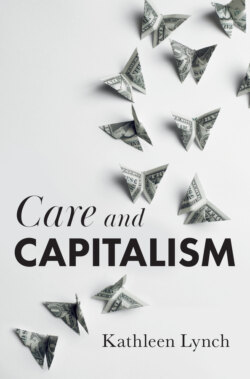Читать книгу Care and Capitalism - Kathleen Lynch - Страница 39
Women in Bureaucratic Organizations
ОглавлениеOrganizations are neither gender neutral (Acker 1990; Witz and Savage 1991; Britton 2000) nor race neutral (Acker 2006; Ahmed 2012). The seemingly ‘disembodied, universal worker’ is in reality a male and a White worker, especially at senior levels; women and men whose skin is Brown or Black are judged by their degree of adherence to the prevailing organizational norm for any given position that has been White-male-dominated and male-defined historically (Joseph 2018). Those who enter positions within organizations do not do so, therefore, on their own terms; they may negotiate, but positions have a status and identity that predate and post-date the potential postholders, and senior posts are coloured-coded White and masculine in White-dominated societies.
While power may not now be entirely in male hands in the twenty-first century in all countries, or in all organizations, men exercise a controlling interest in all the major organizational centres of power. Men have claimed organizational power for themselves at senior levels, be it in business, culture, sport, the arts or the media (Kanter 1977; Collinson and Hearn 1996). Even when some women are present at senior levels, men, being in the majority, exercise the power of veto in most political, cultural and economic institutions.
Even a cursory glance at the leaders of the G20 or the EU 27 highlights the hegemony of White male political power. Outside of politics, men are twice as likely to be managers as women within the European Union: only 6.3 per cent of CEO positions in major publicly listed companies were held by women in 2019 (European Commission 2019: 5). Women’s lower status is reflected in their earnings: around 25 per cent of the top one per cent of wage earners in the EU are women, though in some countries it is lower, with just 17 per cent of the top one percent of earners being women in the UK (European Commission 2019: 20). Men’s dominance of senior posts and their higher earnings are likely to continue, especially with the rise of globalized corporations where geographical mobility and 24/7 availability are expected (Vahter and Masso 2019). A long-hours’ work culture is not conducive to good caring, simply because it takes time from care.
Kate Millett’s assertion some fifty years ago regarding the persistence of men’s patriarchal power remains largely true organizationally today:
the military, industry, technology, universities, science, political offices, finances – in short, every avenue of power within the society, including the coercive force of the police, is [almost]13 entirely in male hands. … What lingers of supernatural deity, the Deity, ‘His’ ministry, together with ethics and values, the philosophy and art of our culture – its very civilization – as T.S. Eliot once observed, is of male manufacture. (Millett 1971: 25)
